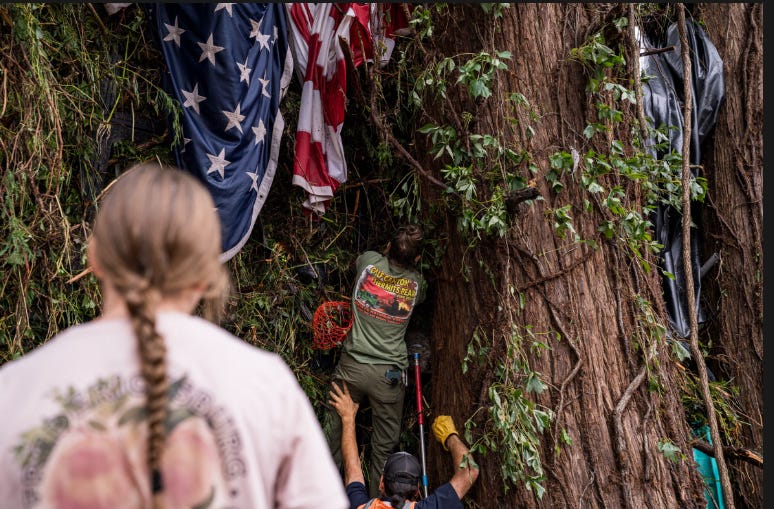The Instant Politicization of Tragedy
Flooding in Texas, and our polarized responses to it, highlight a terrible pattern in the U.S. when tragedy strikes
The same day I attended a very Americana-style Fourth of July luncheon in rural California — complete with brisket, beer, and the Star-Spangled Banner — we learned that a devastating scenario was unfolding in Texas.


There were reports of dozens missing after a quick-moving flood ravaged the Guadalupe River. There was little information, but lots of questions. I felt the devastating contrast: A day of celebration for our independence had started with extraordinary tragedy.
Tragedy that too often in our country of late seems to veer instantaneously into cheap political shots. Unfortunately, even as we pick through the devastation of central Texas, a familiar pattern is repeating itself.
First, something awful happens. Then, with barely a moment’s reflection, we have finger pointing and frustration, politicization of seemingly non-political things (like flooding). Crushing blows, lives lost, communities destroyed and at the same time America grieves further a system that too often doesn’t learn the lessons that could make us safer, or more united, next time.
Among the victims in this latest tragedy were dozens of young girls and women who had been at Camp Mystic, an all-girls Christian summer camp. At least 27 campers and counselors died when the river rose 26 feet in just 45 minutes, with others still missing. It hurt my heart reading the stories. This was a place parents trusted to help their daughters develop into the best versions of themselves. Instead, too many of those bright futures were cut tragically short.
The confirmed deaths include 8-year-old Linnie McCown of Austin and 18-year-old counselor Chloe Childress from the Houston area. As a mother who spent the fourth of July watching kids play and laugh, the images hit with particular force. These weren't statistics — they were someone's daughters, someone's whole world, gone in an instant.

The Hot Take Industrial Complex
Within hours of the tragedy, the usual suspects were already performing their familiar dance of blame and political point-scoring.
Social media filled with poorly-formed hot takes about everything from weather service cuts to FEMA capabilities, many coming from people who had no experience in disaster recovery an hour earlier.
A Houston pediatrician even posted that Kerr County residents "got what they voted for" because supposedly they voted to gut FEMA. That vile comment that cost her job but exemplifies how quickly tragedy becomes political ammunition, often sprayed in both directions.
This week, Donald Trump has said he will visit the disaster area this Friday. Predictably, some are angry he's not there faster. Others are furious he’s going at all. (Having planned the massive security and logistical footprint these presidential visits require, I believe waiting until Friday allows him to respond meaningfully without pulling desperately needed resources from ongoing rescue efforts. But nuance doesn't drive clicks or outrage).
The pattern seems to be the same these days.
A few months ago, it was closer to home for us, after Los Angeles burned. President Trump was quick to blame California officials for water policies that had nothing to do with the fires. There was also the blame game of absence in the face of disaster that’s become a regular point of frustration. When Ted Cruz fled to Cancun during Texas's winter storm crisis, his critics pounced while his defenders made excuses.
Now we had Cruz again out of the country — this time vacationing in Europe over the Fourth of July weekend (an ironic place for someone who wraps himself in Americana to spend Independence Day) while his state faces another crisis. And we're seeing similar knee-jerk reactions about this flooding. Always the same, more heat than light, more performance than solutions.
These disasters have become opportunities for political theater rather than moments for serious examination of what went wrong and how we can do better. The hot take industrial complex churns out content while families are still searching for their loved ones.
Beyond the Performance
What we need is exactly what we're worst at providing: Sustained attention that extends far beyond the news cycle. Real disaster response isn't performative. It is the unglamorous work of rebuilding infrastructure, updating flood maps, and holding officials accountable not just in the immediate aftermath but years later when the cameras are gone.
In California, I walk through the hollowed-out community of Altadena almost every night during summer because of our involvement in sports at a county facility there. It's a stark reminder that while news attention and political blame games fade within days, the actual work of recovery takes years. We're still awaiting federal funds that have become subject to partisan fighting rather than urgent need.
The families who had loved ones in the disaster in Texas don't need our hot takes or political posturing. They need our sustained attention and support. They need us to remember their losses not just this week but next month, next year, when the hard questions about flood management and emergency response can be asked outside of the heat of immediate grief.
We have to develop longer attention spans than we've shown. We have to seek out news about recovery, not just devastation. We have to hold officials accountable for long-term solutions, not just immediate reactions. Most importantly, we have to remember that behind every disaster statistic are real families whose lives have been shattered.
The young girls at Camp Mystic deserved better than to become political talking points.
They deserved to grow up. They deserved to become the remarkable women they were meant to be. They deserved so much more. We can't give that back, but we can honor their memory by demanding better from ourselves and our leaders.
Not just this week, but for all the weeks and years to come.




Nicely put Johanna. “they deserved to grow up”. That sentence alone brings such sorrow.